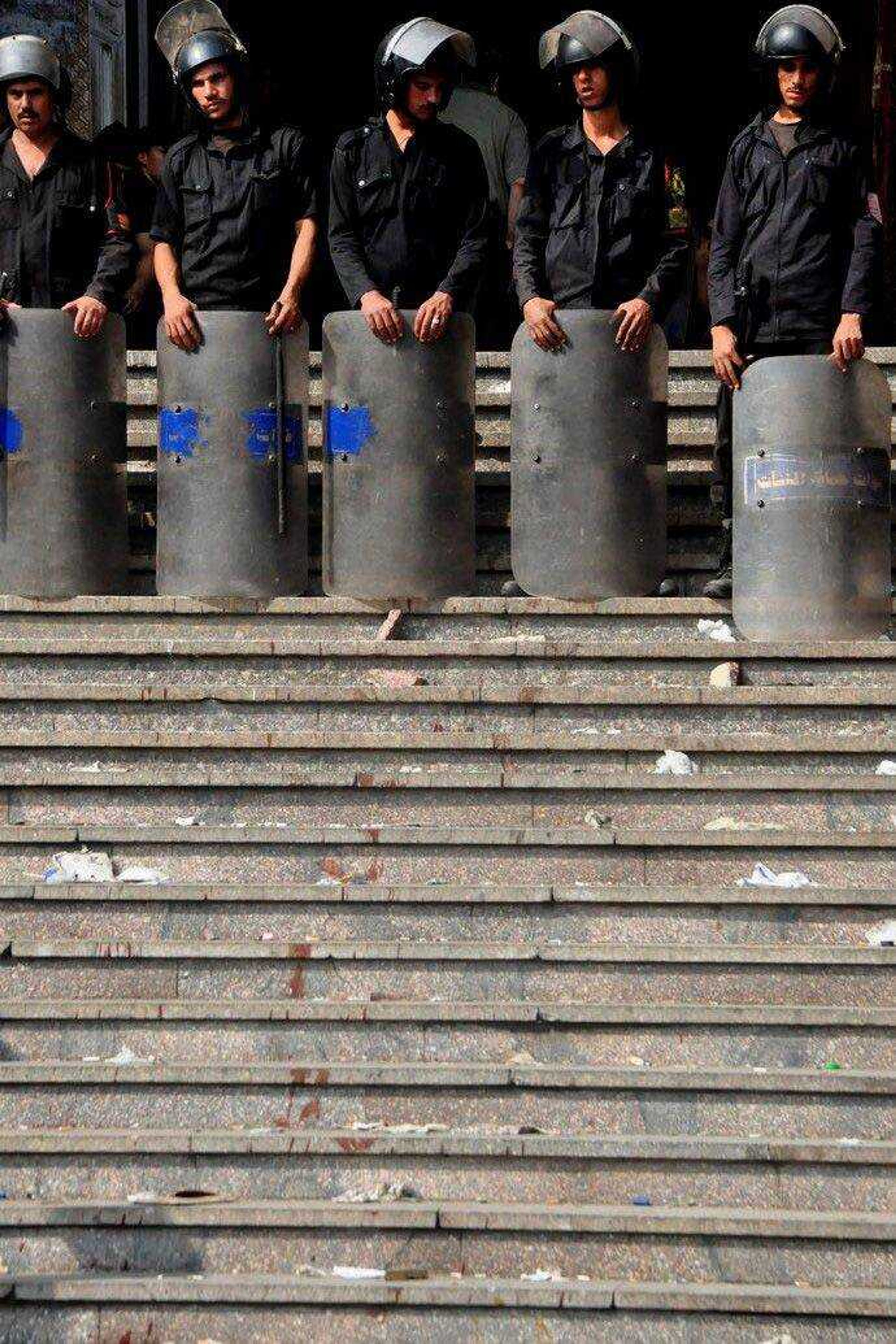Egyptian forces storm protester-held mosque
CAIRO -- Egyptian security forces stormed a Cairo mosque Saturday after shooting at armed men firing down from a minaret, rounding up hundreds of supporters of the country's ousted president who hid there overnight after violent clashes killed 173 people...
CAIRO -- Egyptian security forces stormed a Cairo mosque Saturday after shooting at armed men firing down from a minaret, rounding up hundreds of supporters of the country's ousted president who hid there overnight after violent clashes killed 173 people.
Security officials said officers raided the Ramses Square mosque out of fears the Muslim Brotherhood again planned to set up a sit-in similar to those broken up Wednesday in assaults that killed hundreds of people. The Egyptian government meanwhile announced it had begun deliberations on whether to ban the Brotherhood, a long-outlawed organization that swept to power in the country's first democratic elections a year ago.
Such a ban -- which authorities say is rooted in the group's use of violence -- would be a repeat to the historic and decades-long power struggle between the state and the Brotherhood. It also could provoke more unrest in Egypt following the July 3 military coup against President Mohammed Morsi, a Brotherhood member.
The assault on the al-Fath Mosque began overnight Friday, as pro-Morsi protesters and armed men fled into worship center to avoid angry vigilantes and arrest. They piled furniture in the mosque's entrance to block authorities and enraged anti-Morsi protesters from reaching them.
The mosque earlier served as a field hospital and an open-air morgue as a Brotherhood-called day of protests descended into violence. By daybreak Saturday, security forces and armored personnel carriers surrounded the mosque and it appeared that military-led negotiations might defuse the standoff.
Then gunmen took over a mosque minaret and opened fire on the security forces below, the state-run MENA news agency said. The crowd around the mosque panicked as soldiers opened fire with assault rifles, the chaos broadcast live on local television channels.
Several security officials said ending the standoff at the mosque was essential after receiving information the group planned to turn it into a new sit-in protest camp. They spoke on condition of anonymity in line with regulations.
On Wednesday, riot police, military helicopters, snipers and bulldozers broke up two sit-in protests by Morsi supporters, leaving more than 600 people dead and thousands injured. That sparked days of violence that killed 173 people and injured 1,330 people on Friday alone, when the Brotherhood called for protests during a "Day of Rage," Cabinet spokesman Sherif Shawki said.
Among those who died Friday was Ammar Badie, a son of Brotherhood spiritual leader Mohammed Badie, the group's political arm said in a statement.
Prime Minister Hazem el-Beblawi, who leads the military-backed government, later told journalists that authorities had no choice but to use force in the wake of recent violence.
"I feel sorry for valuable blood shed," el-Beblawi said. However, he cautioned athere will be no "reconciliation with those whose hands are stained with blood or those who hold weapons against the country's institutions."
Signaling the Brotherhood's precarious political position, Shawki said the government was considering ordering the group be disbanded. The spokesman said the prime minister had assigned the Ministry of Social Solidarity to study the legal possibilities of dissolving the group. He didn't elaborate.
The Muslim Brotherhood, founded in 1928, came to power a year ago when its Morsi was elected in the country's first free presidential elections. The election came after the overthrow of autocrat Hosni Mubarak in a popular uprising in 2011.
The fundamentalist group has been banned for most of its 85-year history and repeatedly subjected to crackdowns under Mubarak's rule. While sometimes tolerated and its leaders part of the political process, members regularly faced long bouts of imprisonment and arbitrary detentions.
Disbanding the group, experts say, would mean allowing security forces to have a zero-tolerance policy in dealing with the group's street protests, as well as going after its funding sources. That could cripple the Brotherhood, though it likely wouldn't mean an end to a group that existed underground for decades.
The possible banning comes amid calls by pro-military political forces to brand the Brotherhood a "terrorist organization."
"We are calling for declaring the Brotherhood as a terrorist group," said Mohammed Abdel-Aziz, one of the leaders of the Tamarod youth movement that had organized mass rallies calling Morsi's ouster.
The military-backed government has declared a state of emergency and imposed dusk-to-dawn curfew since Wednesday, empowering army troops to act as a law enforcement force. Top Brotherhood leaders, including Morsi, remain held on a variety of charges, including inciting violence.
Since Morsi was deposed in the popularly backed military coup, the Brotherhood stepped up its confrontation with the new leadership, rallying thousands and vowing not to leave until Morsi is reinstated.
After security forces broke up the protest camps, Islamist supporters stormed and torched churches and police stations. In response, authorities authorized Egypt's security authorities to use deadly force against those attacking vital government institutions.
On Saturday, Egypt's Interior Ministry said in a statement that a total of 1,004 Brotherhood members were detained in raids across the country and that weapons, bombs and ammunition were confiscated from the detainees.
Also Saturday, authorities arrested the brother of al-Qaida chief Ayman al-Zawahri, a security official said. Mohammed al-Zawahri, leader of the ultraconservative Jihadi Salafist group, was detained at a checkpoint in Giza, the city across the Nile from Cairo, the official said.
The official spoke on condition of anonymity as he wasn't authorized to brief journalists about the arrest.
Connect with the Southeast Missourian Newsroom:
For corrections to this story or other insights for the editor, click here. To submit a letter to the editor, click here. To learn about the Southeast Missourian’s AI Policy, click here.










